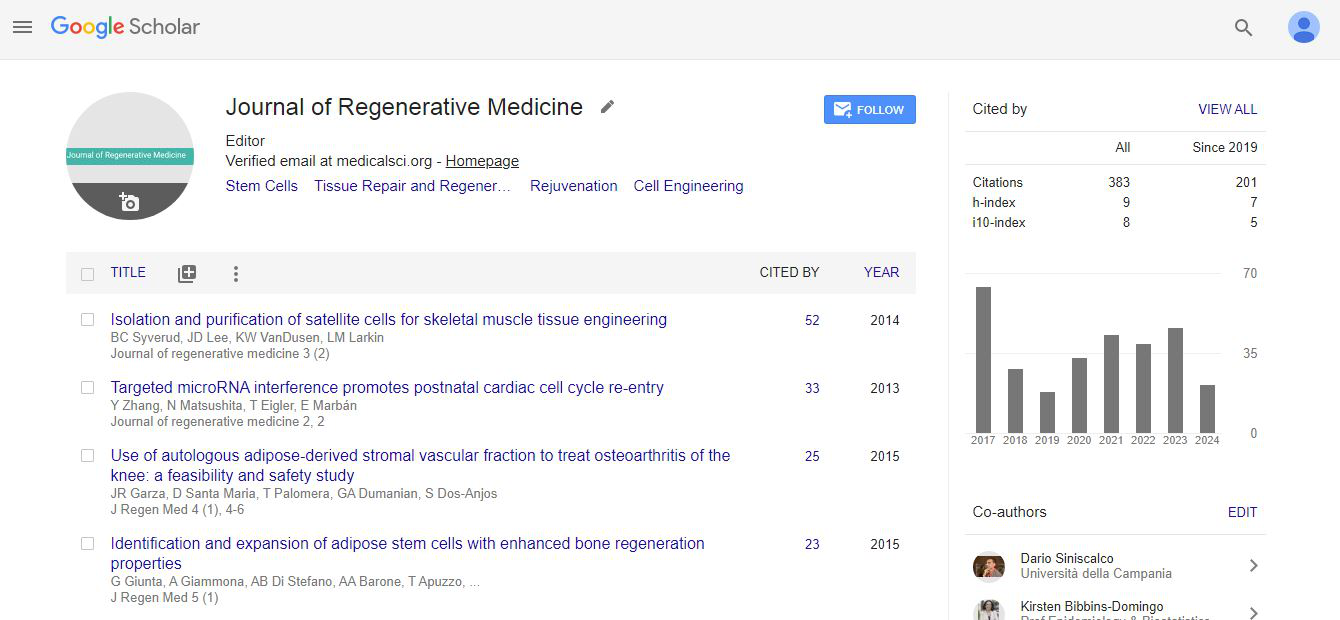Highly stable growth factors and their application to biomedical fields
Hang Cheol Shin
Soongsil University, South Korea
: J Regen Med
Abstract
Growth factors are important polypeptides that act as a signal for cell proliferation and tissue repair. Due to their intrinsic properties, growth factors have an important application in wound healing, hair growth, stem cell culture and exosome production. Despite the various therapeutic potentials, commercially available growth factors have limitations such as short half-life, which indicates lack of stability at room temperature, and loss of activity after storing in a variety of formulations. We have developed structurally stabilized epidermal growth factor (ST-EGF), basic fibroblast growth factor (ST-bFGF), keratinocyte growth factor (ST-KGF) and fibroblast growth factor-9 (ST-FGF9) to overcome limitations of commercially available growth factors. None of the ST-growth factors were toxic, and they were more stable at higher temperatures and showed much longer half-life than commercially available growth factors. We have successfully applied these stabilized growth factors to hyaluronate-collagen dressing (HCD) matrix which showed a more rapid rate of tissue repair as compared to the control in type I and II diabetes models. We also formulated a growth factor cocktail (Cellcurin®) and found effectiveness for the treatment of androgenetic alopecia. Recently, we have expanded the application to the production of high-quality stem cells and exosomes. The pluripotent stem cells (ESCs, ASCs and iPSCs) cultured with ST-bFGF showed better characteristics compared to the cells cultured with commercially available bFGF in terms of cell proliferation, stemness, morphology, and differentiation. The stem cells cultured with ST-bFGF produced high quality exosomes that showed excellent anti-inflammatory activity. Given the importance of stem cells that have a wide range of applications in medical and biotechnology fields, we anticipate that ST-bFGF, a thermostable and long-acting bFGF, can play a key role in securing high-quality stem cells through various sets of stem cell culture process. References 1. Kim, Jihyun & Lee, Kyoung-Mi & Han, Seung & Ko, Eun & Yoon, Dong Suk & Park, Ik & Shin, Hang-Cheol & Park, Kwang & Lee, Jae-Woo. (2021). Development of stabilized dual growth factor-loaded hyaluronate collagen dressing matrix. Journal of Tissue Engineering. 12. 204173142199975. 2. Choi, Seongmi & Lee, Kyoung-Mi & Kim, Hyun Jung & Park, Ik & Kang, Hwi & Shin, Hang-Cheol & Baek, Dawoon & Choi, Yoorim & Park, Kwang & Lee, Jae-Woo. (2017). Effects of structurally stabilized EGF and bFGF on wound healing in type I and type II diabetic mice. Acta Biomaterialia. 66(6). 3. Heo, Seungryong & Lee, Juyong & Joo, Keehyoung & Shin, Hang-Cheol & Lee, Jooyoung. (2017). Protein Loop Structure Prediction Using Conformational Space Annealing. Journal of chemical information and modeling. 57(5).
Biography
Hang Cheol Shin is currently a Professor at the School of Systems Biomedical Science, Soongsil University and also an Adjunct Member of Korea Institute for Advanced Study, KAIST and Advisor of PnP Biopharm, a biotech venture company. Throughout his career, his research has been focused on understanding the folding-structure-function relationship of proteins and peptides and development of production process for recombinant proteins from microorganism. He deciphered protein folding initiating sites and structural propensity of protein sequence using several model proteins and the role of chaperone protein such as protein disulfide isomerase on the protein folding mechanism in vivo. Using structure-function relationship, he designed various analogs of therapeutic proteins, such as hyperactive TNF-α mutants, single-chain insulin analogs and highly stable growth factor mutants. His current research interest is focused on the application of growth factors for the development of anti-wrinkle and anti-hair loss therapeutic and cosmetic formulas.
 Spanish
Spanish  Chinese
Chinese  Russian
Russian  German
German  French
French  Japanese
Japanese  Portuguese
Portuguese  Hindi
Hindi 